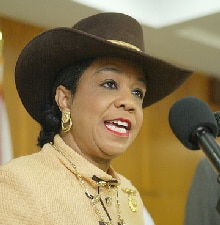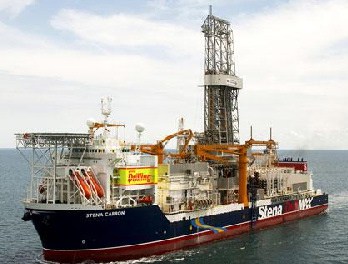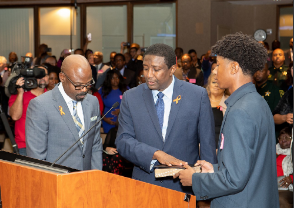Trinidad & Tobago National Receives CARICOM Highest Honour
ST. LUCIA – Former Trinidad and Tobago cabinet minister and Ambassador to CARICOM, Mr. Kamaluddin Mohammed is the recipient of the Caribbean Region’s highest award – the Order of the Caribbean Community (OCC).
The Conference of Heads of Government of the Caribbean Community, at its 33rd Regular Meeting in Saint Lucia, conferred this honour on Mr. Mohammed for the decisive role he played in what can be considered the “Replanting of the Caribbean Vineyard.”
The Order of the Caribbean Community is an award given to Caribbean nationals whose legacy in the economic, political, social and cultural development of Caribbean society is phenomenal. The Award was established at the Eighth Conference of CARICOM Heads of Government in 1987, but was first conferred on Trinidad and Tobago’s William Demas; Guyana’s Sir Shridath Ramphal and Saint Lucia’s Nobel Laureate, Derek Walcott in 1992.
Mr. Mohammed has enjoyed an illustrious 30-year political career serving as Minister in various ministries, including in the capacity of acting Prime Minister. He is also the recipient of a Doctor of Letters honoris causa from the University of the West Indies and his country’s highest Award, the Order of Trinidad and Tobago.
In a citation read by Ambassador Colin Granderson, CARICOM Secretariat Assistant Secretary-General, Foreign and Community Relations Directorate, Mr. Mohammed was singled out for his contribution as Minister of West Indian Affairs, especially in relation to his contribution to the forging of Caribbean Economic Cooperation.
The Citation stated that his role in the early integration movement earned him the moniker “Mr. CARIFTA” which was no misnomer, and given the Community’s trade and economic cooperation structures including the Single Market which have been built on the foundations that he played such a leading role in “planting”, makes him most deserving of the Community’s highest accolade …”
Mr. Mohammed is now entitled to affix the letters OCC behind his name. He also received an 18 carat medallion and a miniature version of the CARICOM insignia in the form of a lapel pin. He joins the rank of 24 other Caribbean stalwarts:
1992: William Gilbert Demas, Trinidad and Tobago Sir Shridath Ramphal, Guyana Derek Walton Walcott, Saint Lucia
1994 Dame Nita Barrow, Barbados Justice Phillip Telford Georges, Dominica Sir Meredith Alister McIntyre, Grenada The Most Hon. Michael Norman Manley, Jamaica
1998 The Rt. Hon Vere Cornwall Bird Snr. Antigua and Barbuda H.E. Arthur Napoleon Raymond Robinson, Trinidad and Tobago Sir Philip Manderson Sherlock, Jamaica Sir Garfield Sobers, Barbados
2001 Sir George Alleyne, Barbados George Price, Belize Slinger Francisco (The Mighty Sparrow), Trinidad and Tobago
2003 Dame Eugenia Charles, Dominica Sir John Compton, Saint Lucia Mr. Lloyd Best, Trinidad and Tobago
2008 Professor the Honourable Ralston ”Rex’ Nettleford, OM, Jamaica The Honourable George Lamming, CHB Brian Charles Lara, TC, Trinidad and Tobago His Excellency Dr. Nicholas Joseph Orville Liverpool, DAH
2009 The Most Hon. Percival James Patterson, Jamaica
2011 Sir Edwin Carrington, Trinidad and Tobago
CITATION FOR THE AWARD Of THE ORDER OF THE CARIBBEAN COMMUNITY (OCC) TO MR. KAMALUDDIN MOHAMMED
REPLANTING THE VINEYARD
INTRODUCTION
A few weeks ago, one of the Region’s outstanding Visionaries, Sir Shridath Ramphal, spoke to the Region about “Labouring in the (Caribbean) Vineyard”, during his presentation at the 26th Eric Williams Memorial Lecture. Specifically, he lamented the missed opportunity of the West Indies Federation which was dissolved on 31st May, 1962 – fifty (50) years ago.
Today we have the pleasure of paying due tribute to, and honouring one of those who later played a decisive role in what can be considered the “Replanting of the Caribbean Vineyard”. He is Dr. Kamaluddin Mohammed, a national of Trinidad and Tobago, and fondly known at home and throughout the Caribbean Region as KAMAL.
HIS EARLY LIFE AND EDUCATION
KAMAL is the fifth in a family of thirteen (13) children. Though he came from a poor family, he was blessed with a broad and rich education in Islamic family values and respect for authority. After attending the Canadian Mission School in El Socorro, he won a scholarship to Osmond High School. A people person, a man with a common touch, KAMAL became an active member of his community – El Socorro – and was deeply involved in religious and social work. He became a leader in the development of East Indian Culture hosting as he did, the radio show titled Indian Talent on Parade. He was also an outstanding musical composer of Indian songs. That was the early KAMAL.
ENTRY INTO POLITICS
In 1953, at the age of 26, KAMAL entered politics, winning a seat in the Community Council elections of February of that year. He was soon to be named Chairman of the Council. Events flowed quickly thereafter. In 1954 he met Dr. Eric Williams who subsequently became the leader of the Government of Trinidad and Tobago for virtually the next quarter century. Williams was to play a decisive role in KAMAL’s further development.
Standing in the general elections of 1956 for the Party he helped form with Williams, The People’s National Movement (PNM), KAMAL won the seat of St. Joseph. He formed part of the first Executive Council of Trinidad and Tobago as he subsequently became Minister of Agriculture, Land and Fisheries.
Apart from serving as Acting Prime Minister of Trinidad and Tobago, KAMAL, over his thirty (30) years in politics, was at various times, Minister for Public Utilities; for West Indian Affairs; for External Affairs; for Health; and for Local Government. He also served as Ambassador to CARICOM for three years. Obviously, for someone to have held so many different portfolios speaks volumes regarding their capacity. This is the case of Kamaluddin Mohammed.
Despite his many and varied streams of contribution to Caribbean development, our consideration today would concentrate on his contribution as Minister of West Indian Affairs, especially in relation to his contribution to the forging of Caribbean Economic Cooperation. It is mainly due to his outstanding contribution in that field that we are honouring him today – an act none too soon.
KAMAL was Trinidad and Tobago’s Minister of Public Utilities at the time when the issue of a Free Trade Agreement in the context of regional Economic Cooperation arose. Reports emerged that the leaders of Antigua, Barbados and Guyana – that is Messrs. Bird, Barrow and Burnham, respectively – had been discussing regional Economic Cooperation and at a meeting at Dickenson’s Bay in Antigua on 15 December 1965 had even signed an Agreement to that end. That Agreement had also committed their countries to signing a Free Trade Treaty on 15 May 1967.
These developments which would not have included Trinidad and Tobago were clearly upsetting to its Prime Minister. He consequently moved swiftly to try to delay the signing of the Treaty as well as to gain entry for Trinidad and Tobago in the Free Trade Area arrangement. KAMAL was chosen as the man for the job. He was named Minister in the newly created Ministry of West Indian Affairs,
It was obvious however, that KAMAL had a clear picture of what his new role meant in relation to the significance of a Caribbean Economic Community. Speaking at the El Socorro Islamic School on 23 August 1967 on his new responsibilities, for the first time publicly, KAMAL said among other things the following:
As some of you know, the Ministry of West Indian Affairs was created for the specific purpose of fostering an Economic Community in the Caribbean Region.
The main idea behind such a grouping is that our peoples already linked together by geography, by culture, by history and by similar or near similar types of economy, should unite further to form an Economic Bloc of approximately five million people – an Economic Bloc which will pool all available resources in a mass self-help programme aimed at increasing consumption through the creation of wider marketing areas and thereby raising the standard of living in the Region.
Put in its simplest form the proposed Caribbean Economic Community is therefore a move to bring about economic cooperation in matters of trade and production by the Caribbean territories. The Ministry of West Indian Affairs, the Ministry charged with bringing about this Economic Cooperation, is necessary as an independent Ministry because the Caribbean scene today is faced with many problems not least of which are those involving Economic Cooperation and these have assumed such tremendous importance that the territories are faced with the alternative of sinking alone in isolation or swimming together with hope to reach the shores of success”.
These words of KAMAL in 1967 and the vision they imparted still bear great relevance today.
Thus armed, and having prepared a Plan of Action for clearance by his Prime Minister, KAMAL set out on his historic mission. First, he went to Guyana to brief Prime Minister Burnham and to seek his support in convincing the other two leaders involved to agree to a delay in the signing date for the Treaty as well as to facilitate Trinidad and Tobago’s entry into the group to sign the Caribbean Free Trade Area Agreement (CARIFTA). Despite Burnham’s agreement and assistance the other two leaders did not readily welcome the idea. The record states that “Bird was receptive but indecisive and Barrow was hostile.”
With that kind of response, KAMAL had a major challenge if he were to succeed in getting Trinidad and Tobago as part of the proposed CARIFTA arrangements and to have postponed the date of signing of said Agreement. Returning home without success was also not an option that KAMAL was prepared to accept.
Faced with this situation, and assisted by J. O’Neil Lewis, Mr. Mohammed journeyed to Antigua and Barbados for further and more intense discussions with the leaders of those two countries. At the end he succeeded in getting agreement on both counts – the date for the signing of the Agreement was postponed to 1 May 1968 and Trinidad and Tobago’s participation was agreed.
The road was now clear for “the all-out policy shift to include the other territories of the Region”. In this drive, KAMAL used all available means, including shuttle diplomacy, to facilitate discussions with other West Indian territories. He was determined to widen the net covering the region in respect of CARIFTA. In this regard, he was ably assisted by Shridath Ramphal, then Attorney General of Guyana, by Ed Lake, Minister of Trade of Antigua, and by George Ferguson, Minister of Trade of Barbados. KAMAL was determined to take the lead, as he did for Trinidad and Tobago, for the cause of wider West Indian integration – a cause he fervently believes in up to this day.
Their efforts brought significant success resulting in numerous meetings of Officials in Guyana (August 1967) and a critical meeting of Caribbean leaders in Barbados (October 1967). It has been said and with good reason that it was as a result of this Barbados meeting that it was agreed that Free Trade should be introduced in all the Commonwealth Caribbean countries by 1 May 1968.
A supplementary agreement to the original CARIFTA Agreement was consequently signed in Georgetown, Guyana, on 15 March 1968 and in St. John’s, Antigua, on 18 March 1968. CARIFTA DAY was set for 1May 1968.
Apart from everything else, this was a personal triumph for KAMAL. As a consequence, so moved was his Prime Minister that he wrote to KAMAL on April 25, 1968 the following:
“I wish to congratulate you for the loyal, effective and energetic manner in which you have discharged your duties as Minister of West Indian Affairs … with the successful completion of the negotiations for the establishment of CARIFTA, a task which you have initiated but is by no means complete”.
He went on to state that:
“The operation and further evolution of CARIFTA will need your continuing attention, since you will be this Government’s representative on the CARIFTA Council.”
Secondly, “the whole question of external trading alignments between Trinidad and Tobago and some or all of the CARIFTA countries on the one hand, and third countries on the other hand, will have to be actively followed up”.
Equally important was the need for CARIFTA to “ensure that the Leeward and Windward Islands derive the fullest possible benefits from the Free Trade Area. No less importantly, he stressed ‘the need for the Caribbean integration process to be taken further on the basis of a consensus among the member countries of CARIFTA.’
Aware that Trinidad and Tobago would have to play an active role in relation to all these matters, the Prime Minister of Trinidad and Tobago said, “I have decided to entrust you with the responsibility of coordinating all of these inter-related aspects of our external trade policy and where necessary, of making explorations and initiating discussions”. That was Kamaluddin Mohammed’s continuing mandate, one, as the evidence stares us in the face, that he carried out with distinction.
That he came to be called Mr. CARIFTA, was therefore no misnomer, and given the Community’s trade and economic cooperation structures including the Single Market which have been built on the foundations that he played such a leading role in “planting”, makes him most deserving of the Community’s highest accolade, and that, even without taking into account the many other streams of contribution he has made to Caribbean cooperation and development.
KAMAL has also been the recipient of a Doctor of Letters honoris causa from the University of the West Indies. Dr. Kamaluddin Mohammed has also been the recipient of his country’s highest award, the Order of Trinidad and Tobago.




